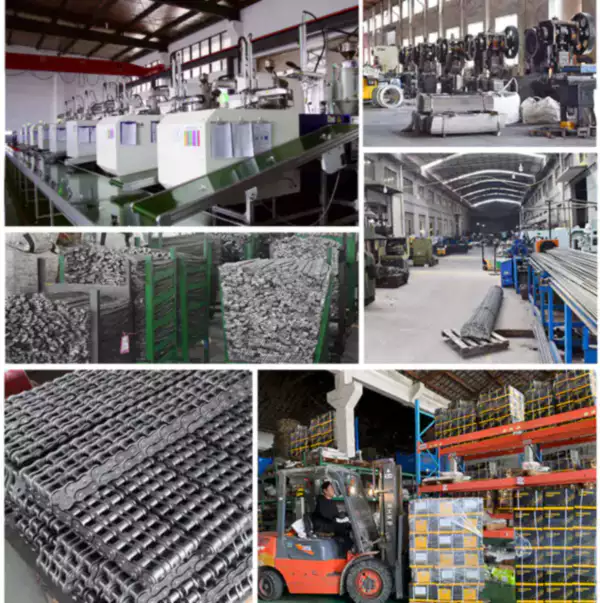Gripper chains are a widely used type of conveyor chain that are designed to grip the load being conveyed. They are commonly used in a wide range of industries, including the automotive, food and beverage, and packaging industries. While they offer a number of benefits, including high efficiency and reliability, there are also environmental considerations that need to be taken into account with their use.
Wear and Tear
One of the primary environmental considerations with gripper chain use is the wear and tear that can occur over time. As the chain grips the load being conveyed, it can cause damage to the surface of the load. This can lead to increased material waste and the need for more frequent maintenance to keep the conveyor system running smoothly.

Lubrication
Another important consideration is the need for lubrication. Gripper chains require regular lubrication to operate effectively and prevent wear and tear. However, the use of lubricants can have environmental impacts if they are not properly managed. The lubricant can contaminate the environment if it is not disposed of properly, leading to potential harm to wildlife and the ecosystem.
Noise Pollution
Gripper chains can also create significant noise pollution if they are not properly maintained. As the chain grips the load being conveyed, it can create a loud noise that can be disruptive to workers and nearby residents. This can lead to complaints and potential fines for the company if noise levels exceed regulatory limits.

Energy Consumption
The energy consumption associated with gripper chain use is another important consideration. These chains can consume a significant amount of energy, especially if they are not properly maintained or if the conveyor system is not properly designed. This can result in higher energy bills and increased greenhouse gas emissions.
Material Sustainability
Finally, the sustainability of the materials used in gripper chains is an important environmental consideration. The materials used to make these chains, such as steel and plastic, can have a significant impact on the environment if they are not responsibly sourced and recycled.

Gripper Chains Purchasing Guide
| Factor | Considerations |
|---|---|
| Load Capacity | Determine the maximum load that the gripper chain will need to carry. |
| Chain Material | Choose a material that is durable and sustainable, such as recycled steel or plastic. |
| Lubrication Requirements | Consider the lubrication requirements of the gripper chain and choose a lubricant that is environmentally friendly. |
| Noise Pollution | Choose a gripper chain that is designed to minimize noise pollution. |
| Certifications | Look for gripper chains that have been certified by industry organizations for their environmental sustainability. |
Sprockets for Gripper Chains
Sprockets are an essential component of gripper chains, as they help to ensure that the chain operates smoothly and efficiently. At Everpower, we offer a wide range of sprockets that are designed to work seamlessly with our gripper chains. Our sprockets are made from high-quality materials and are designed to be durable and long-lasting.

When used together, our gripper chains and sprockets can help to optimize the performance of your conveyor system and minimize environmental impacts. Our sprockets are designed to ensure that the gripper chain operates smoothly, reducing the risk of wear and tear and minimizing the need for maintenance.
In addition to our high-quality sprockets, we also offer a range of other products that are designed to work seamlessly with our gripper chains, including conveyor belt systems and other conveyor accessories. Our team of experts can help you choose the right products for your specific needs, ensuring that your conveyor system operates at peak efficiency while minimizing environmental impacts.

Our Advantages
- We are a leading manufacturer of gripper chains, with extensive experience in the industry.
- We use only the highest-quality materials in our products, ensuring durability and reliability.
- We offer a wide range of products, including sprockets and conveyor accessories, to help optimize the performance of your conveyor system.
- We are committed to environmental sustainability and work to minimize the environmental impacts of our products and operations.
- We offer exceptional customer service and support, ensuring that our customers always have access to the products and information they need.
Q&A
Q: How can I reduce the environmental impacts of gripper chain use?
A: To minimize environmental impacts, it is important to choose a gripper chain that is designed for sustainability and choose environmentally friendly lubricants. Regular maintenance can also help to ensure that the chain operates efficiently, reducing the risk of wear and tear and minimizing the need for replacement.
Q: What are the benefits of using gripper chains?
A: Gripper chains offer a number of benefits, including high efficiency, reliability, and the ability to grip a wide range of loads. They are commonly used in a wide range of industries, including automotive, food and beverage, and packaging.
Q: What factors should I consider when choosing a gripper chain?
A: Factors to consider include load capacity, chain material, lubrication requirements, noise pollution, and certifications for environmental sustainability.
Edited by Zqq.
